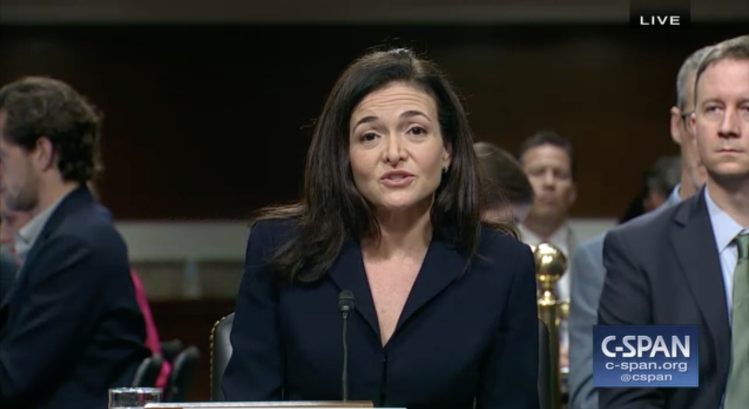testsetset
When Facebook COO Sheryl Sandberg and Twitter CEO Jack Dorsey testified in front of the Senate Intelligence Committee on Wednesday, it was the fourth such hearing held by the committee in the past year on how foreign actors are manipulating users on social platforms.
But it wasn’t Facebook and Twitter who Senators were most angry with. Instead, it was Google, who declined the committee’s request to send Sundar Pichai or Larry Page. (Google did offer to send Kent Walker, its chief legal officer, but the committee declined the invitation.)
Nearly every Senator expressed his or her displeasure with Google before asking direct questions of Twitter and Facebook. The Committee decided to place an empty chair set aside for Google next to Sandberg and Dorsey, to emphasize their displeasure.
“I would have thought leadership at Google would have wanted to demonstrate how seriously they take these challenges,” Senator Mark Warner, D-VA, said during his opening remarks.
June 5th: The AI Audit in NYC
Join us next week in NYC to engage with top executive leaders, delving into strategies for auditing AI models to ensure fairness, optimal performance, and ethical compliance across diverse organizations. Secure your attendance for this exclusive invite-only event.
If Google skipped today’s hearing in order to avoid participating in any embarrassing photo ops or tough lines of questioning, there weren’t many during today’s hearings. Instead, Google got to listen as Senators speculated about the company’s intentions, without the ability to offer pushback.
Senator Marco Rubio (R-FL) speculated that Google didn’t come because they didn’t want to answer questions about a recent BuzzFeed News report that Google failed to stop researchers who posed as Russian trolls from buying political ads. Senator Tom Cotton (R-AR) criticized Google for its reported interest in building a search engine in China.
The purpose of the hearing was, ostensibly, to share how much progress Facebook and Twitter have made in dealing with foreign interference on their platforms, just two months before the U.S. midterm elections. However, neither Sandberg nor Dorsey shared many new details on how their respective companies were doing so.
Both companies emphasized that they had already met twice to discuss how to share information about foreign interference as the midterms approach — something which BuzzFeed News already reported on. Dorsey and Sandberg said that they would like to meet more frequently and formalize the process, but didn’t discuss how to do so.
In her opening remarks, Sandberg said that Facebook was too slow to spot groups associated with Russia and the Russian troll group the Internet Research Agency spreading misinformation on Facebook during the 2016 U.S. presidential election.
“This interference was completely unacceptable — it violated the values of our company, and the country we love,” Sandberg said.
Chairman of the Senate Intelligence Committee Richard Burr (R-NC) implored both companies in his opening and closing remarks to let Congress know if they were experiencing any “impediments” in sharing information about the foreign interference they’ve found on their platforms. However, neither Sandberg or Dorsey discussed any during their testimony.
Other topics that came up during Wednesday’s testimony included what responsibilities Facebook and Twitter think they have to promote free speech around the world and deny requests from authoritarian regimes to share user data, as well as what kind of information they intend to provide going forward to users who shared a Tweet or Facebook post from foreign actors.
Dorsey emphasized several times during Wednesday’s hearings that and that he believes Twitter needs to do a better job of “meeting its users where they are,” and questioning the “fundamental” incentives that Twitter gives users today.
For example, he said that he’s rethinking how Twitter displays the follower counts of users, as that may incentivize users to simply gain more followers, rather than prioritizing other activity on Twitter. He also said that Twitter wants to work more with academics and law enforcement, but again declined to give specifics on how the company intends to do so.
“We’re here to contribute to a healthy public square — not compete to have the only one,” Dorsey said.
Sandberg, for her part, received more questions than Dorsey about what Facebook was doing to fight hate speech and misinformation.
She repeated many of the talking points emphasized by CEO Mark Zuckerberg and other Facebook execs in the past few months — that hate speech is against Facebook’s policies, though it’s continuing to refine what it defines as hate speech. Additionally, she reiterated that Facebook believes the best way to fight fake news is to limit its reach in News Feed, and work with third-party fact-checkers to determine if it should be labeled with a “false” label — rather than remove it from Facebook altogether.
Today’s hearings gave few indications about whether Congress will introduce new legislation to regulate Facebook in the near future. Senator Warner simply said in his opening remarks that Congress has to “find smart, thoughtful policy solutions … without applying ham-handed 20th century solutions to 21st century problems.”
The Senate meetings was the first and only hearing of the day for Sandberg. Dorsey, meanwhile, will testify before the House Energy and Commerce Committee later this afternoon.

